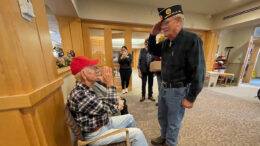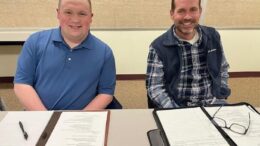Yesterday I had to cover a meeting.
I don’t mind covering meetings because generally they are real and the participants are far more engaged with each other than they are with me. So, as a result, I can watch body language and expressions to find those subtle moments (or not subtle in some cases) that hopefully can convey visually the thoughts or feelings of those involved.
Monday’s meeting was deemed a legislative hearing. It was actually more of an information-gathering mechanism for a handful of legislators to hear what is going on in the communities they are visiting. Members of the state house and senate visited Venango County with emphasis on learning more about the increasing opiate problems, the rising number of drug-related deaths and crimes and what they can do to help community law-enforcement and agencies on the front lines confronting the problem head on.
One of the local presenters was Oil City’s police chief, Bob Wenner, who has been battling the problem first hand in his city. When he spoke he was very candid as he addressed the legislators. Before that I watched him listen to his colleagues in law enforcement (State Trooper Michelle McGee and Venango County District Attorney Shawn White) speak of the issues they face in the region and county. I was taken by Wenner’s quiet calm as he sat and listened. I took note of his body language and facial expressions. I could see his concern mount for his city as he listened to stories from his colleagues that he has heard before.
Now, I don’t really know the chief well and have had only a few small conversations with him over the last year. I can’t say exactly what was on his mind at this moment when I made this picture, but his concern was evident. In these small conversations with him I have come to know of his frustrations with trying to deal with issues of drugs and drug-related crimes in his city with cuts in manpower and funding.
He is fully aware of what a big problem this is and that he is concerned for his community.
As I made this picture of him, I thought about how difficult it must be to talk about what seems like obvious starting points toward fixing a problem. He, as well as every community, needs more manpower, more resources and laws holding people accountable for their actions leading to the problems we face.
The people on the panel of legislators who were there Monday seemingly all share concerns about the drug problems in their communities. That is why they were there. Some asked questions that indicated they are fully aware of the problem and want to advocate for the changes needed to help these community officials get what they need to battle the problem. However, getting an entire panel of legislators on the same page about funding and what laws will work when it comes to drug enforcement can be difficult. Never mind the entire legislature.
As a photojournalist, I try to teach younger photojournalists that sometimes your ears are more important than your sense of composition or skill with a camera and equally as important as your eyes. I listened to everyone speak and, as I did, I watched how they spoke and how they listened. I saw some people appear more interested than others and I saw the chief sit stoically and listen as he waited to speak.
I made a picture.
Now, so you know, the first time I met the chief I thought he was a security guard hired to just stand watch during a City Council meeting. He was just a guy standing in the hall and very unassuming, very approachable and even helped me know where the agendas were and even where council chambers were (I was very new). “That was the police chief,” reporter Jill Harry told me as she laughed at me for calling him the security guard later when we talked about the meeting we both attended. Since then I have watched him interrogating suspects. I’ve watched him come up to folks at a festival to just check in that everything was going smoothly, and I have watched him direct traffic at a corner that a kids parade was going to come through. He is a hands-on chief that works the job needed to be done.
(I need to interject here that I am not often easily impressed by folks in leadership roles or authority figures. I respect them, but am not always impressed.)
I was very impressed with what was said by all six people who presented information to the legislators. They all spoke like passionate members of a community with jobs to serve with whatever means they are given.
When Wenner started to speak, I had already made this picture of him. Yet the words and deliberate tone he used immediately made me think I really made a picture of a man facing a problem with the concern of a leader and of a servant. I realized what I was seeing in his stare as well as the tension in his jaw and forehead earlier was a reflection of the words he spoke at the meeting. He spoke of the good that had been accomplished from recent busts but reminded everyone that there are always replacements on the way to fill the void of what ever drugs and drug dealers they manage to take off the street.
His stare appeared to be a combination of frustration and determination mixed with a whole lot of worry.
As a journalist, it is not my roll to tell anyone what they should do or think. In fact, I should remain unbiased and present only information I can source as true.
But this drug epidemic is scary. When town police forces everywhere are being overwhelmed by drug users and distributors who can often be dangerous people, it puts us all at risk simply for being in the wrong place at the wrong time. Not only drug users are affected by the ill effects of drugs, we all are. The drug use is only a small, very sad part of the problem. Crimes of theft, of prostitution and sex trafficking, of people getting caught between something bad going down by others – shootings, stabbings and gang activity – are all part of the problem we face in a society overrun with rampant and predatory drug users. And the deaths are becoming staggering.
There should be concern for the safety of our police officers as well. Cuts in budgets might make us feel happier at tax time, but at what cost? There should be concern in all of our minds on how to find a solution to growing problems opiates and the current rash of heroin trafficking/use are having on our community. Law-enforcement’s uphill battle is even more difficult without the proper support from the community and the legislature.
The Derrick and The News-Herald are working on an ongoing series to show what is being done locally to try to find solutions to the drug problems facing us. Reporter Sally Bell has already written several stories and several more are to come. And our city reporters have covered many stories on crimes and their impact on neighborhoods and the police effort.
Things like this hearing Monday are good to seek out information that can lead to change. But Wenner and the others on the panel know that gathering information has to lead to action and their pleas for funding, more help, stiffer laws and penalties need to be heard. If their efforts fall on deaf ears, then that would make these meetings a waste of everybody’s time. And if nothing (or not enough) is done, then we are seemingly comfortable keeping ourselves at risk.
I realized when I made this picture of the chief I was making a picture of my own concerns as well.
(NOTE: Congressman R. Lee James hosted the event and Sen. Scott Hutchinson was also on the panel of legislators from around the region listening to Venango County Coroner Christina Rugh, Venango County Substance Abuse Program Director Marie Plumer, pharmasist Shane Judy as well as Wenner, White and McGee. This is one of eight such meetings scheduled across the state to gather information.)































